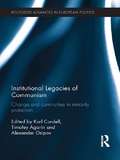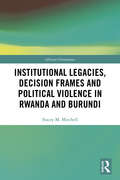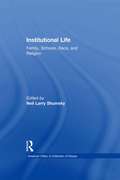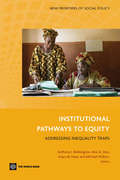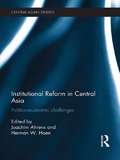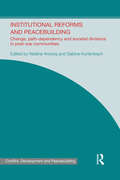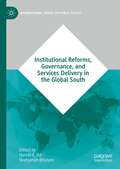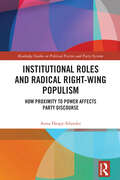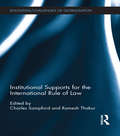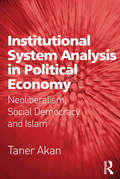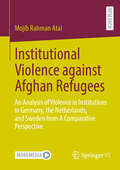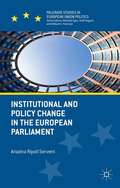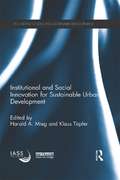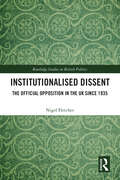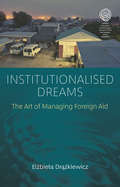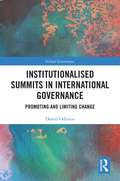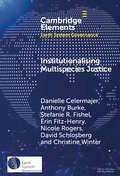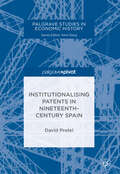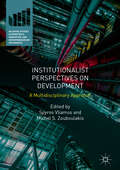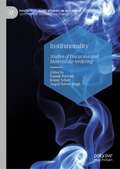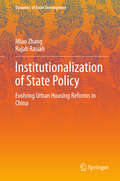- Table View
- List View
Institutional Legacies of Communism: Change and Continuities in Minority Protection (Routledge Advances in European Politics)
by Timofey Agarin Karl Cordell Alexander OsipovTwenty years after the demise of communist policy, this book evaluates the continuing communist legacies in the current minority protection systems and legislations across a number of states in post-communist Europe. The fall of communism and the process of democratisation across post-communist Europe led to considerable change in minority protection with new systems and national political institutions either developed or copied. In general, the new institutions reflected the practices and experiences of (western) European states and were installed upon advice from European security organisations. Yet many ideas, legislative frameworks, policies and practices remained open to interpretation on the ground. With case studies on a diverse set of post-communist polities including Slovakia, Bosnia, Macedonia, Ukraine, Estonia, Croatia, the Baltic States and Russia, expert contributors consider how the institutional legacies of the communist past impact on policies designed to support minority communities in the new European democracies. Providing unique empirical material and comparative analyses of ethnocultural diversity management during and after communism, this book will be of interest to students and scholars of international relations, European politics, political geography, post-communism, ethnic politics, nationalism and national identity.
Institutional Legacies, Decision Frames and Political Violence in Rwanda and Burundi (African Governance)
by Stacey MitchellRwanda and Burundi are strikingly similar countries that underwent democratization in the early 1990s. In both, resistance to democratic reforms led to coups d’état and presidential assassinations. A conundrum arises in terms of what transpires next. In Rwanda, total genocide was perpetrated by extremist Hutu actors, including government officials, upon the country’s Tutsi and politically moderate Hutu populations. In Burundi the coup d’état failed and instead ushered in a lengthy period of civil war. This divergence in outcome is puzzling given the similarity of these two countries, and it is not adequately explained by studies that address collective violence in each. This book utilizes an integrative approach that facilitates the formation of an explanation that more fully accounts for variation in the type of collective violence that occurred in Rwanda and Burundi. Showing that political actors – during periods of major institutional change – do not all respond to or perceive reform in the exact same manner or in a necessarily rational manner, this book makes an important contribution to the literature on ethnic conflict, collective violence and democratization in Africa.
Institutional Life: Family, Schools, Race, and Religion (Essays on Mexico Central South America)
by Neil Larry ShumskyFirst Published in 1996. Volume 8 in the 8-volume series titled American Cities: A Collection of Essays. This series brings together more than 200 scholarly articles pertaining to the history and development of urban life in the United States during the past two centuries. Volume 8 discusses several institutions that are uniquely urban: voluntary associations, vigilance committees, and organized police forces. These articles attempt to consider race and ethnicity class, gender, and the various experiences of different groups of Americans.
Institutional Origins of Islamist Political Mobilization
by Quinn MechamMuslim countries experience wide variation in levels of Islamist political mobilization, including such political activities as protest, voting, and violence. Institutional Origins of Islamist Political Mobilization provides a theory of the institutional origins of Islamist politics, focusing on the development of religious common knowledge, religious entrepreneurship, and coordinating focal points as critical to the success of Islamist activism. Examining Islamist politics in more than 50 countries over four decades, the book illustrates that Islamist political activism varies a great deal, appearing in specific types of institutional contexts. Detailed case studies of Turkey, Algeria, and Senegal demonstrate how diverse contexts yield different types of Islamist politics across the Muslim world.
Institutional Pathways to Equity: Addressing Inequality Traps
by Michael Walton Timothy Kessler Anthony BebbingtonQuestions of equity and inequality have moved to the center of debates on development and poverty reduction. This reflects growing awareness that even countries with high rates of growth can experience stagnating or increasing inequality, and that inequality can itself limit the poverty reducing effects of growth. Indeed, recent work indicates that, in addition to its intrinsic value, equity should be valued for its positive impacts on growth and the poverty-reducing effects of such growth. These concerns are coupled with questions of governance. This is because institutional arrangements affect not only overall rates of growth but also the distributional effects of growth, and are themselves more or less equitable in their structure and functioning. How given institutional arrangements emerge over time, with their implications for growth and equity, remains less understood. 'Institutional Pathways to Equity: Addressing Inequality Traps' tackles the relationship between equity and development, the place of institutions in determining these relationships, and the conditions under which particular institutional arrangements can either block or promote transitions toward more equitable forms of development. The chapters, originally commissioned as background documents for the preparation of the World Development Report 2006, are prepared by leading scholars from the fields of economics, political science, sociology, geography, and development studies. The book speaks directly to current discussions on inequality, poverty, and growth and will contribute to the construction of a historically informed political economy of development. The book specifically highlights the importance of inequality, institutional change through social mobilization, and institutional change through state policies. The authors show that, under certain conditions, state institutions can and have taken a leading role in promoting policies to redress inequitable social relations and so weaken the social foundations of inequality traps.
Institutional Reform in Central Asia: Politico-Economic Challenges (Central Asian Studies)
by Joachim Ahrens Herman W. HoenThe countries of Central Asia are increasingly the focus of intense international attention due to their geopolitical and economic importance as well as their unsettled transition processes. The region faced enormous challenges when the Soviet Union disintegrated, and this book focuses on the reforms of the institutional environment that have been largely neglected. Through an interdisciplinary approach, the book explores key aspects of institution building as well as economic and political governance in Central Asia. Contributors from a variety of disciplines, such as economics, political economy, political science, sociology, law, and ethnology, investigate the challenges of institutional transition in a non-democratic region. The book discusses how the lack of effective institution building as well as rule enforcement in the economic and political realms represents one of the key weaknesses and drawbacks of transition, and goes on to look at how crafting market institutions will be of utmost importance in the years ahead. Making an important contribution to understanding of political-economic developments in Central Asia, this book is of interest to students and scholars of political economy, comparative economics, development studies and Central Asian studies.
Institutional Reforms and Peacebuilding: Change, Path-Dependency and Societal Divisions in Post-War Communities (Studies in Conflict, Development and Peacebuilding)
by Nadine Ansorg Sabine KurtenbachThis book deals with the question how institutional reform can contribute to peacebuilding in post-war and divided societies. In the context of armed conflict and widespread violence, two important questions shape political agendas inside and outside the affected societies: How can we stop the violence? And how can we prevent its recurrence? Comprehensive negotiated war terminations and peace accords recommend a set of mechanisms to bring an end to war and establish peace, including institutional reforms that promote democratization and state building. Although the role of institutions is widely recognized, their specific effects are highly contested in research as well as in practice. This book highlights the necessity to include path-dependency, pre-conflict institutions and societal divisions to understand the patterns of institutional change in post-war societies and the ongoing risk of civil war recurrence. It focuses on the general question of how institutional reform contributes to the establishment of peace in post-war societies. This book comprises three separate but interrelated parts on the relation between institutions and societal divisions, on institutional reform and on security sector reform. The chapters contribute to the understanding of the relationship between societal cleavages, pre-conflict institutions, path dependency, and institutional reform. This book will be of much interest to students of peacebuilding, conflict resolution, development studies, security studies and IR.
Institutional Reforms, Governance, and Services Delivery in the Global South (International Series on Public Policy)
by Hamid E. Ali Shahjahan BhuiyanThis edited book explores the link between institutional reforms, governance and services delivery in the Global South, mapping how and to what extent resource-poor governments deliver public services to their citizens. The book concludes that delivery of public services responsibly and efficiently remains largely unachievable because of weaker institutions and poor quality of governance in the Global South countries. Reforms to governance and institutions are generally considered fitting measures to overcome public service delivery challenges.
Institutional Research Initiatives in Higher Education
by Nicolas A. Valcik Jeffrey Alan JohnsonAmerican higher education faces a challenging environment. Decreasing state appropriations, rising costs, and tightening budgets have left American colleges and universities scrambling to achieve their missions with ever more limited resources. Campus leaders have therefore increasingly relied upon institutional research and strategic planning departments to make transparent and rational decisions and to promote good stewardship of critical but finite resources. Institutional Research Initiatives in Higher Education illustrates the wealth of institutional research activities occurring in American higher education. Featuring chapters by a prominent mix of authors representing community colleges, traditional undergraduate institutions, land grant institutions, research and flagship universities, and state agencies, this book provides numerous insights into the contemporary challenges, innovative programs, and best practices in institutional research. With contributors from a variety of regions and types of institutions, each chapter provides rigorous analysis of campus-based research activities in areas such as strategic planning, admissions and enrollment management, assessment and compliance, and financial planning and budgeting. Like the departments it studies, Institutional Research Initiatives in Higher Education is an invaluable resource for university administrators, researchers, and policymakers alike.
Institutional Roles and Radical Right-Wing Populism: How Proximity to Power Affects Party Discourse (Routledge Studies on Political Parties and Party Systems)
by Anna Heapy-SilanderThis book examines how the proximity to government and different institutional roles–being in opposition, government or supporting a minority government–influence European radical right-wing populist (RRWP) parties’ discourse.Analysing case studies of different institutional roles – Finns Party (opposition), Fidesz (government) and the Danish People’s Party (supporting a minority government) – the book presents how the framing of the RRWP’s ideology and policies adapt to decision-making and power. It investigates whether there are alternative factors which better explain the possible changes in tone – such as domestic or foreign events – and finds that the party discourse is such a robust and identifying character of the RRWP parties that the different institutional roles do not moderate as previously thought.This book is of key interest to scholars and students of the radical right, party politics, populism, policymaking and, more broadly, European and comparative politics.
Institutional Supports for the International Rule of Law (Challenges of Globalisation)
by Ramesh Thakur Charles SampfordThe rule of law is widely seen as the cornerstone of any effective polity and increasingly a vital component of the international political system. If the international rule of law were to be strengthened, it would greatly contribute to trade, security, human rights and global cooperation in a range of fields. Yet, in many areas the rule of law seems almost absent in international affairs. This book explores the institutions that support the effectiveness of the rule of law domestically. It focuses on the extent to which similar institutions already exist at international level and analyses the possibility of their further development. The authors speculate on how the international rule of law might be advanced in the future, thereby suggesting potential strategies for strengthening the international rule of law. Adopting an interdisciplinary approach and combining the fields of international relations, politics and law, this book covers a range institutions including: UN Security Council International Court of Justice Human rights machinery Regional human rights International Criminal Court World Trade Organization International Tribunal for the Law of the Sea UN Department of Peacekeeping Operations. It will be of strong interest to students and scholars of international relations, international organisations, global governance, international law, migration law, international peace and security law, applied ethics, political economy, political science and sociology.
Institutional System Analysis in Political Economy: Neoliberalism, Social Democracy and Islam
by Taner AkanThe enduring debate on institutional pillars of contemporary political economies has gathered a noticeable momentum in terms of the change, path-dependence, and varieties of capitalism. By taking a methodological standpoint claiming that ’the current structure and the future of contemporary societies can only be understood by using an evolutionary and macro institutional approach that would explain the trajectories of social structures from a systemic perspective’, this book first aims at formulating a novel analytical framework thus, Institutional System Analysis in Political Economy. This framework comprises, inter alia, a model of path-dependent changes, and then attempts to apply it to the case of the Ottoman-Turkish social system. In sum, the book develops an ’interaction-theoretic and evolutionarily-structured approach’ with an aim to better capture the path-dependence and change of political, economic, and cultural action in terms of their intersectional dynamics.
Institutional Violence against Afghan Refugees: An Analysis of Violence in Institutions in Germany, the Netherlands, and Sweden from A Comparative Perspective
by Mojib Rahman AtalThe long-lasting political instability in Afghanistan since the Soviet Union invasion in 1979 has displaced millions of Afghans, both internally and internationally. Despite their growing numbers, the challenges that Afghan refugees encounter in public institutions and everyday interaction with members of their host countries have remained largely uninvestigated. This research thus explores perceived institutional violence against Afghan refugees in Germany, the Netherlands, and Sweden. The semi-structured interviews provide evidence on the occurrence of perceived verbal violence, and differential and poor treatment in institutions. The quantitative analysis lends empirical evidence to the extent, factors, grounds, and consequences of institutional verbal violence, institutional failure, everyday discrimination, and sense of belonging. Permanent residence, school education, age, having children, country of residence, citizenship, and employment were identified as factors significantly affecting the experiences and perceptions of respondents. Respondents reported negative experiences mostly in institutions that often deal with migration and asylum matters. Legal status, ethnic origin, religion, unemployment, appearance, and lower language proficiency seem to be the main grounds for institutional violence.
Institutional and Policy Change in the European Parliament
by Ariadna Ripoll ServentIn a European Union increasingly worried about the security of its citizens and its territory, how should the European Parliament make policy decisions on these issues? In the past, its open defence of civil liberties and human rights have sparked recurring conflicts with member states on the European Council. Since 2005, the European Parliament has gained the power to co-decide in most internal security matters and can also give consent to international agreements. Its full participation in decision-making led to the expectation that the emphasis on security would decrease yet these last few years have seen continuity rather than change in this policy area. This study investigates why the formal empowerment of the European Parliament did not lead to a new balance between security and liberty. It argues that, in its new position as a full decision-maker, the European Parliament faced a crucial trade-off: in order to be accepted as a legitimate and effective partner in inter-institutional negotiations, it had to abandon its traditional positions and accept that security would remain the cornerstone of this policy area.
Institutional and Social Innovation for Sustainable Urban Development (Routledge Studies in Sustainable Development)
by Harald A. Mieg Klaus TöpferWhich new institutions do we need in order to trigger local- and global sustainable urban development? Are cities the right starting points for implementing sustainability policies? If so, what are the implications for city management? This book reflects the situation of cities in the context of global change and increasing demands for sustainable development. The book introduces core findings, new methods, and international experience related to sustainability innovations and the social transformation of cities, synthesizing insights from megacity research, sustainability science, and urban planning. Written by a team of more than fifty leading researchers and practitioners from all five continents, it traces general urban transformations and introduces new approaches such as: smart growth strategies; cross-sectoral, transdisciplinary urban transition management; rubanisation; and city syntegration. The book reveals the potential of new, networked agencies of sustainability transformation, and discusses the role of science institutions in the diffusion and implementation of institutional and social innovations. This comprehensive book is of immense value to students, researchers, and professionals working on issues of sustainable development, in environmental programs in human geography, planning and the built environment, sociology and policy studies, institutional economics, and environmental politics.
Institutional guide to using AI for research (Advances in Artificial Intelligence in Education #2)
by Xue Zhou Hosam Al-SamarraieThis book provides a comprehensive exploration of the integration of artificial intelligence (AI) into academic research, specifically tailored for higher education institutions and postgraduate research (PGR) students. It addresses the unique challenges and opportunities that these institutions and students encounter when incorporating AI into research. The work emphasises practical case studies, step-by-step guides on AI tools and techniques, ethical considerations in AI usage, and features contributions from experts across various disciplines. Following the introduction, the book delves into the specifics of how AI can enhance academic research such as literature review, data analysis and interpretation, and assistance in academic writing across different disciplines. The wide range of topics introduced in this book is supported by practical examples and guidance. This book also explores the landscape of current AI applications in research, the methodologies for effectively leveraging AI technologies, and the critical ethical dimensions of AI work. The importance of interdisciplinary collaboration in expanding the use of AI in research is covered in this book by drawing on expert insights to provide a rich, multifaceted understanding of the potential of AI in academia. The combination of topics in this book can empower PGR students to navigate the complexities of AI in their research. The book is a much-needed compilation prepared by leading scholars in the field of digital technology to help PGRs, as well as decision-makers, determine the best ways to integrate and use AI tools in research.
Institutionalised Dissent: The Official Opposition in the UK since 1935 (Routledge Studies In British Politics Ser.)
by Nigel FletcherThis book provides a comprehensive analysis of a peculiar but now firmly established British institution— the Official Opposition— tracking its development since 1935. Despite its inherent importance to the conduct of politics and government, the Official Opposition as an institution remains poorly understood. The concept of ‘Loyal Opposition’ has become so entrenched in the Westminster parliamentary model that it is now taken for granted that the principal challengers to the government of the day are given significant official recognition by the state. Political dissent has become institutionalised and legitimised. Using previously unpublished archive material and candid interviews with former Leaders of the Opposition and their staff, the book examines the constraints and dilemmas facing the Official Opposition. Detailing the way successive opposition leaders have organised their staff and Shadow Cabinets, it highlights the practical difficulties they face in holding the government to account and preparing for government. The study concludes by arguing that the role of the Official Opposition is vital but ill- defined, that the inadequacy of its resources has impacted on its effectiveness, and that there are potentially serious challenges to it as a model. The book will be of key interest to scholars of British politics, British history, parliamentary and legislative studies, and government and democracy more generally.
Institutionalised Dreams: The Art of Managing Foreign Aid (EASA Series #38)
by Elżbieta DrążkiewiczUsing examples from Poland, Elżbieta Drążkiewicz explores the question of why states become donors and individuals decide to share their wealth with others through foreign aid. She comes to the conclusion that the concept of foreign aid requires the establishment of a specific moral economy which links national ideologies and local cultures of charitable giving with broader ideas about the global political economy. It is through these processes that faith in foreign aid interventions as a solution to global issues is generated. The book also explores the relationship linking a state institution with its NGO partners, as well as international players such as the EU or OECD.
Institutionalised Summits in International Governance: Promoting and Limiting Change (Global Governance)
by Daniel OdiniusThis book analyses the role of institutionalised summits in international governance, adding a fresh perspective to the controversial debate over the value of institutionalised summits for international governance. It argues that the contribution of these summits to negotiating and implementing international agreements on policy change is ambivalent. Based on an innovative theoretical model the books proposes that states strategically select summits with their specific institutional design for advancing their policy preferences. Developing the route to the summit and the route from the summit as precise causal mechanisms, the author argues that these choices explain the ambivalence of summit involvement. With empirically rich case studies on the Group of 7 (G7) and the European Council, the book provides a rare systematic comparison of different summits. The empirical record shows strikingly similar patterns for the G7 and the European Council, but it also points to variation deserving further attention in the study of summits in different institutional environments. It will be of interest to researchers in International Relations, Global Governance, and European Politics, and those interested in global institutions and decision-making.
Institutionalising Multispecies Justice (Elements in Earth System Governance)
by Stefanie Fishel Danielle Celermajer Anthony Burke Erin Fitz-Henry Nicole Rogers David Schlosberg Christine WinterMultispecies Justice (MSJ) is a theory and practice seeking to correct the defects making dominant theories of justice incapable of responding to current and emerging planetary disruptions and extinctions. Multispecies Justice starts with the assumption that justice is not limited to humans but includes all Earth others, and the relationships that enable their functioning and flourishing. This Element describes and imagines a set of institutions, across all scales and in different spheres, that respect, revere, and care for the relationships that make life on Earth possible and allow all natural entities, humans included, to flourish. It draws attention to the prefigurative work happening within societies otherwise dominated by institutions characterised by Multispecies Injustice, demonstrating historical and ongoing practices of MSJ in different contexts. It then sketches speculative possibilities that expand on existing institutional reforms and are more fundamentally transformational. This title is also available as Open Access on Cambridge Core.
Institutionalising Patents in Nineteenth-Century Spain (Palgrave Studies in Economic History)
by David PretelThis book examines the development of the Spanish patent system in the years 1826 to 1902, providing a fundamental reassessment of its evolution in an international context. The Spanish case is particularly interesting because of this country’s location on the so-called European periphery and also because of the centrality of its colonial dimension. Pretel gauges the political regulation and organisation of the system, showing how it was established and how it evolved following international patterns of technological globalisation and the emergence of the ‘international patent system’ during the late nineteenth century. Crucially, he highlights the construction and evolution of the patent system in response to the needs of Spain's technologically dependent economy. The degree of industrial backwardness in mid-nineteenth-century Spain set the stage for the institutionalisation of its modern patent system. This institutionalisation process also entailed the introduction of a new technological culture, social infrastructure and narrative that supported intellectual property rights. This book is important reading to all those interested in the history of patents and their role in globalisation.
Institutionalist Perspectives on Development: A Multidisciplinary Approach (Palgrave Studies in Democracy, Innovation, and Entrepreneurship for Growth)
by Spyros Vliamos Michel S. ZouboulakisThis book depicts the role of both formal and informal institutions in achieving long-term economic efficiency and development. It is organized into three sections: the first section deals with the historical and political roots that make institutions favorable to development; the second section offers theoretical perceptions of immaterial institutions; the last section explores how the various official institutions – such as international organizations – interrelate with the process of development. As both the recent global financial crisis and the subsequent sovereign debt crisis within the Eurozone have shown, sustainable development is a combination of human, social and institutional factors that interact with each other and go beyond the strictly economic conditions of each country. With contributions from several countries in Europe as well as Iran, this volume offers readers an international and multidisciplinary perspective of the institutionalist determinants of growth in the long run.
Institutionality: Studies of Discursive and Material (Re-)ordering (Postdisciplinary Studies in Discourse)
by Yannik Porsché Ronny Scholz Jaspal Naveel SinghThis edited book brings together humanities and social sciences scholars from the various disciplines at the nexus of discourse studies and ethnography to reflect on questions of institutional practices and their political concerns. Institutional order plays an important role in structuring power relations in society. Yet, contrary to common understandings of structure, institutional orders are far from fixed or stable. They constantly change, and they are resisted and reimagined by social actors. The 20 studies collected in this edited volume develop the notion of institutionality as an overarching perspective to explore how institutional actors and institutional practices order and reorder power in societies across the globe. Thereby the chapters pay special attention to the fluidity, volatility, fragility, and ambiguity of order, and consequently to its claims to authority. Employing a broad range of discourse analytic and ethnographic methodologies, the studies show how institutions are discursively and materially constructed, defined, represented and how they are made relevant and become powerful – or how they are resisted, transformed or lose significance – in interaction. Readers will obtain nuanced insights into ways in which differently positioned social actors engage in struggles about how institutions can be imagined and enacted across several domains, such as workplace interactions, architecture, mass-media representations or organisational publicity. This book will be of interest to readers in Applied Linguistics, Discourse and Society, Critical Discourse Analysis, Political Theory and Communication Studies.
Institutionalization of State Policy
by Miao Zhang Rajah RasiahUsing fresh evidence and a novel methodological framework, this book sheds light on how institutions have driven economic reform in China's urban housing sector. The book systematically analyzes the developmental role of the state in China, with rich empirical evidence to show how decentralization has brought about significant participation by the different levels of government with the central, provincial and municipal governments focusing on initiation, intermediation and implementation roles respectively. Despite many Western analysts claiming that it is single complex superstructure, the institutionalization of governance structures in China following reforms has taken place through strong coordination between governments at different levels to meet targeted plans. Although China still has a long way to go to before it can be considered developed, this book elaborates on how the country offers a unique alternative for other states seeking to develop by striking a balance between capitalist and socialist instruments.
Institutionalization of World-Class University in Global Competition
by Barbara M. Kehm Jung Cheol ShinMoving the academic debate on from its current focus on development to a more nuanced sociological perspective, this fresh research is a collaboration between academics in South Korea and Germany that assesses the factors shaping world-class universities as institutional social systems as well as national cultural treasures. The work explores in detail how WCUs have moved to a central position in policy circles, and how these often ambitious government policies on WCUs have been interpreted and adopted by university administrators and individual professors. The authors provide a wealth of empirical data on universities, both world-class and aiming for WCU status, in a range of polities and continents. They compare strategies for developing WCUs in countries of the East and the West, both developing and developed. Nations featured in the statistical purview include nine countries (Germany, France, Japan, South Korea, China, Taiwan, Malaysia, Singapore and Hong Kong SAR). The volume goes further than merely taking a snapshot of the current situation, offering detailed and considered strategies and rationales for institutionalizing and developing WCUs, particularly in Asian countries where Confucian cultural influences accord education the highest priority.
